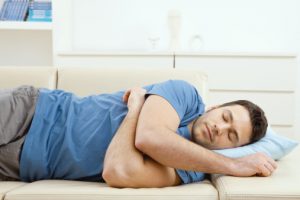 A new study found that men who consumed fatty foods experienced greater daytime sleepiness resulting in an afternoon nap. The study looked at nearly 800 men aged 35 to 80, with those who ate fatty diets reporting greater daytime sleepiness. The findings were not related to body weight, physical activity, or chronic health issues.
A new study found that men who consumed fatty foods experienced greater daytime sleepiness resulting in an afternoon nap. The study looked at nearly 800 men aged 35 to 80, with those who ate fatty diets reporting greater daytime sleepiness. The findings were not related to body weight, physical activity, or chronic health issues.
Researchers suggest that certain “gut neuro-hormones” promote sleepiness. Although the exact mechanism is still unclear, the association between fatty meals and drowsiness during the day is very possible.
Advertisement
The men were surveyed about their eating habits and lifestyle, and underwent an at-home study to detect symptoms of sleep apnea. One-quarter of the men with the highest fatty food intake were more likely to complain of daytime sleepiness, compared to one-quarter who ate the least amount of fatty foods.
Even taking into account other factors, like body weight and physical activity levels, fatty food eaters were still 78 percent more likely to report daytime sleepiness, compared to men who ate the least amount of fatty foods. Furthermore, men who reported the highest fat intake were at greater risk for sleep apnea.
Jim White, a registered dietitian and spokesman for the Academy of Nutrition and Dietetics, commented on the study, “There are many factors that can cause daytime sleepiness. This study does show a relationship with increased fat intake and sleep. But we have to look at people’s overall lifestyle and eating behavior, rather than pointing the finger at one macronutrient.”
“The best chance of having high energy levels during the day is to incorporate a diet that consists of whole grains, lean proteins, fruits and veggies, low-fat dairy, and a high-quality fat intake,” White concluded.
Additional research is required to determine how fatty foods promote sleepiness, whether eating these types at food at a certain time of the day changes the effect, and whether eating fatty foods at night disrupts sleep.
